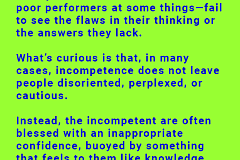 Do these gripes sound familiar?
Do these gripes sound familiar?
- “Salespeople I hire don’t produce, they talk a good game but don’t deliver.”
- “My customer service reps are generally good but it’s hit or miss. We hire someone who seems good but soon find they are abrupt and abrasive with our customers.”
- “We want to find people who have leadership potential but have a hard time finding them, too often, we make substandard choices.”
- “So many choices for training. Programs are available for sales, teams, managers, leaders…how do we know what will provide the biggest ROI?”
[quotes]Is there a way that will help put the right people in the right jobs,[/quotes] help inspire high performance and give you solid answers to where the gaps are so you can deliver the most appropriate training? YES!
We’ve all heard about “assessments” often through our work or college career center. But there are so many assessments out there today it can be challenging to know which ones to choose and, even more importantly, which ones you should choose to help you with problems like those above.
The following will help you understand the types of assessments available, the specific applications for each and – depending on your objective – it will help you make the best choice for your business needs.
Let’s start by looking at assessment types and essentially, there are two types of assessments:
- Personal: Self-evaluation of behavioral/motivating factors/emotions/ skills, competencies, acumen, etc.
- Feedback: Evaluations from a variety of sources specific to a subject, individual, or group.
[quotesright]There are three different types of personal assessments. [/quotesright]
1. Personal Self-Evaluations
- The first type of self-assessments is designed to provide information and insights related to how individuals view themselves.
The insights from a behavioral assessment can be of great value to leaders for improving their ability to communicate and motivate their team. By providing deeper understanding of the leader’s natural behavioral and mindset tendencies (strengths, limitations, communication preferences), a behavioral assessment helps them maximize their own performance. The knowledge gained about communication will help them and their teams communicate and function more smoothly together. It can also give leaders the insights to place employees in positions that best suit the needs and requirements of the business and the employee.
Examples of behavioral self-assessments are the DISC® tools. This type of assessment provides insights and understanding of HOW an individual chooses to do the job. A DISC assessment gives you assessments of their strengths and limitations, provides insights into how best to communicate with them, and how they may react under stress.
- The second type of personal assessment focuses on an individual’s self-assessment of his/her competency, skill, or acumen in specific areas.
These assessments provide a benchmark for the current state of an individual or team. The value of these insights is to aid in determining training needs and objectives along with development goals focused specifically on individual or team needs.
Examples of these assessments are the EQ or Emotional Quotient™, which measures Emotional Intelligence or acumen, and Sales Skills Index™, which measures one’s knowledge of what to do at various stages in the sales process.
The second type of personal assessment focuses on the driving forces that motivate us. These insights help in the understanding of WHY we do what we do.
The value provided by these assessments is a deep understanding of what drives an individual. These insights contribute to eliminating conflicts; creating an effective business culture; and motivating, managing, training individuals and teams most appropriately.
Examples of the indicators produced from these assessments include Driving Forces, Workplace Motivators, and Personal Motivation & Engagement.
2. 360 Feedback assessments
[quotes]360 assessments provide feedback from others[/quotes] about a specific subject, individual, team, or group. For instance, a leader’s abilities could be assessed based on feedback from peers, direct reports, supervisors, and the leader him/herself.
The value from this type of assessment is gaining insights from many perspectives, as opposed to just one with self-assessments. Additionally, 360 feedback is anonymous and collected in complete confidence, which results in more honest and candid information. GAPS between self-perspective and feedback of others can be evaluated and development programs designed to address very specific and focused needs.
Examples of 360 feedback assessments include OD 360 Survey, T.E.A.M.S. and a variety of others which can be customized to address very specific needs.
Use with caution
There is risk when using assessments.
When utilizing any type of assessment, be sure to clarify how the results of the assessments will be used since assessments are not infallible and can impose significant legal requirements for how they may be used. That is particularly true when hiring, promotion, and firing.
Assessments can be extremely helpful in the hiring process. If you are using them for this purpose, insure that appropriate protocols for vetting a candidate are practiced (interviewing, resume, recommendations, etc.) [quotesright]Especially when hiring, promoting or not hiring or promoting someone, check with your legal counsel[/quotesright] to ensure you that you are using the assessment correctly to protect you and your company.
Other uses for assessments
Assessments can also be very powerful for:
- Individual Development: The best assessment is the one that fits the individual’s needs AND the organization’s needs. By discovering strengths as well as weaknesses, appropriate training, workshops and coaching can be tailored to maximize the contribution of the person to the business.
- Team Development: Understanding goes a long way in team situations – especially when the pressure is on to get results. When teams understand communication styles and can recognize how best to communicate with each person on a team, it helps remove friction and speed up understanding. Knowing who has what strengths and responds best to a given challenge helps put the right team member on each task.
Are assessments valuable? Absolutely!
Assessments are valuable tools, but remember, an assessment without the understanding of its nuances, limitations, and strengths is a bit [quotes]like handing the keys to your new car to your 14-year-old and saying, “Drive safely.”[/quotes]
Besides using the right assessment, it is essential that you work with a qualified professional or coach to guide you through understanding and applying assessments. Besides imparting the necessary understanding to maximize the value of your assessment, they will help minimize the natural resistance to something new employees are being asked to do. They can work with you and your team to make the learning stick, be applied, and maximize the return you get on your investment in assessments.
As your FocalPoint Business and Training Coach I am here to be your partner in choosing the best solution to meet your business needs. Give me a call or email me to discuss how assessments can help your team be more productive. USA: 877.433.6225 feedback@focalpointcoaching.com
- by Cynde Herman, FocalPoint Business Coach











